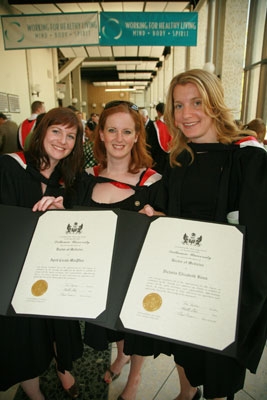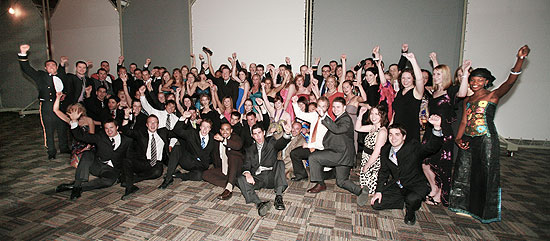 |
| Drs. April MacPhee, Jaclyn Flemming, Victoria Bonn, Class of 2009. (Kerry Delorey, Calnen Photography) |
±«Óătv medical graduates in 2009 ranked first, according to national exam results, just released, that assess newly minted MDs’ preparedness for residency training.
The first-time achievement for ±«Óătv is “a credit to our students and our faculty,” said Dr. Dianne Delva, ±«Óătv’s associate dean of medical undergraduate education.
“The main challenge,” she added, “as we undertake curriculum renewal, is to maintain our strengths while overcoming our challenges.” A revised curriculum is scheduled for introduction this September.
In scores for all Canadian medical students —although not statistically different— ±«Óătv graduates ranked first on their responses to multiple-choice questions on surgery and family medicine, and second in clinical decision-making, pediatrics and psychiatry.
All 88 ±«Óătv students who sat the examination, last spring, were successful.
“Our students were above the Canadian mean in all other aspects of the exam,” said Dr. Delva, “except obstetrics and gynecology.”
This year, the Medical Council of Canada, which sets the annual examination, provided participating medical schools with the topic areas in which their students fared at least 10 per cent better or worse than the other Canadian graduates who took the exam.
Dr. Delva said these results will help formulate content for the refresher Critical Review and Mastery course, offered to ±«Óătv’s candidates before they write the examination.
This latest student achievement, she added, confirms that last year’s accreditation decision by the Liaison Committee on Medical Education was not a reflection or a comment on ±«Óătv medical students’ performance.
“It has been excellent,” she said.
 |
| Another reason to celebrate! Just released results of the Medical Council of Canada Qualifying Examination Part I, ranked ±«Óătv's Class of 2009 first in the country. Above, is an impromtu class picture taken during graduation festivities last year (Kerry Delorey, Calnen Photography) |
Last year, the LCME renewed accreditation of the university’s undergraduate medical program for a probationary 24-month period, citing the need for better curriculum management, monitoring and evaluation oversight.
Known as the Medical Council of Canada Qualifying Examination Part I, it is a one-day computer-based test given to medical students who have completed requirements for their MD and are about to start residency programs.
The exam evaluates a candidate’s knowledge, clinical skills, and attitudes, as set out in the Medical Council of Canada’s Objectives.
Candidates complete multiple-choice questions in one 3.5-hour session and then tackle a longer clinical decision-making component.
The Medical Council of Canada also administers another examination, the MCCQE Part II. Taken by doctors after they have amassed at least 12 months postgraduate clinical training, it assesses the competency of candidates before they go into independent clinical practice.
Candidates must pass both examinations to obtain the Licentiate of the Medical Council of Canada and to be included in the Canadian Medical Register.
Attainment of the licentiate is a prerequisite for licensure by provincial and territorial medical regulatory authorities to practice medicine within their jurisdiction.
To the ±«Óătv students, who did so well in the MCCQE Part I last spring, and to the faculty and the Critical Review Mastery course organizers who contributed to the students’ success, Delva offered “congratulations” and the commendation, “well done!”
